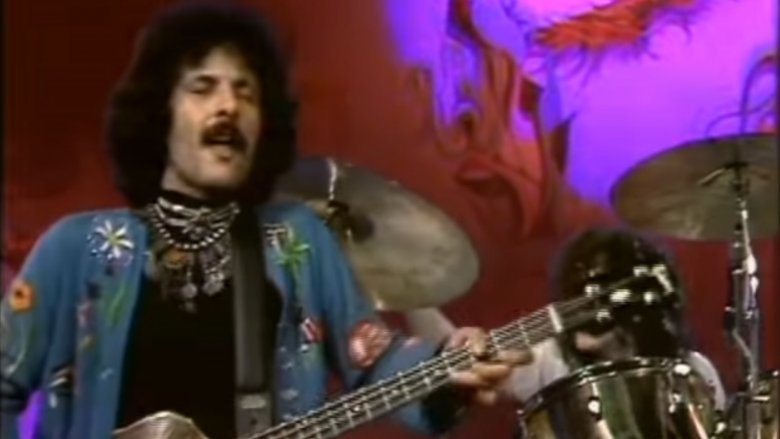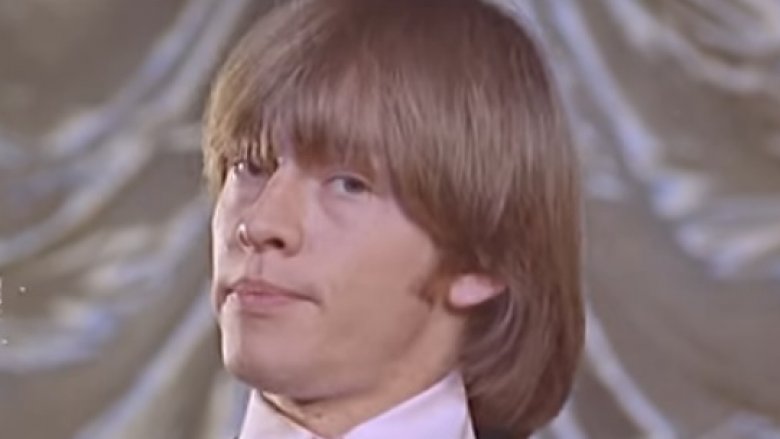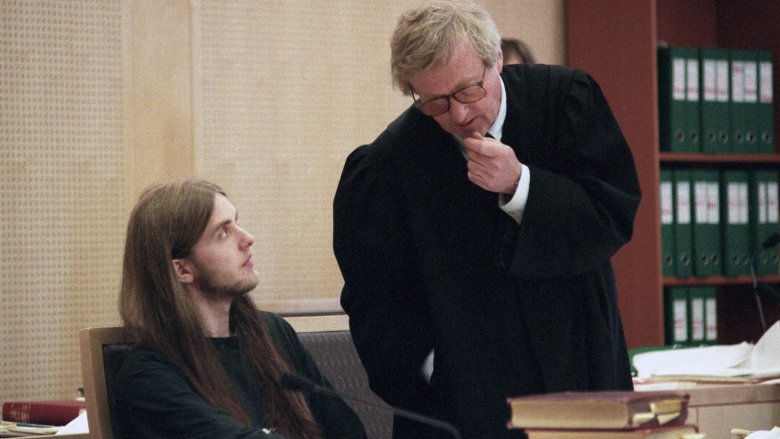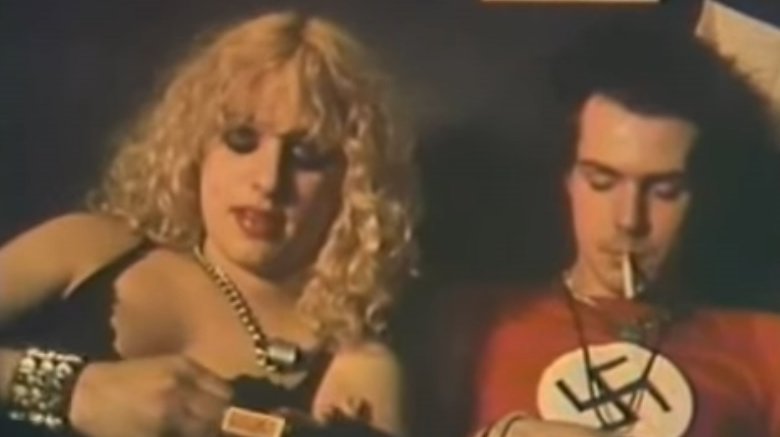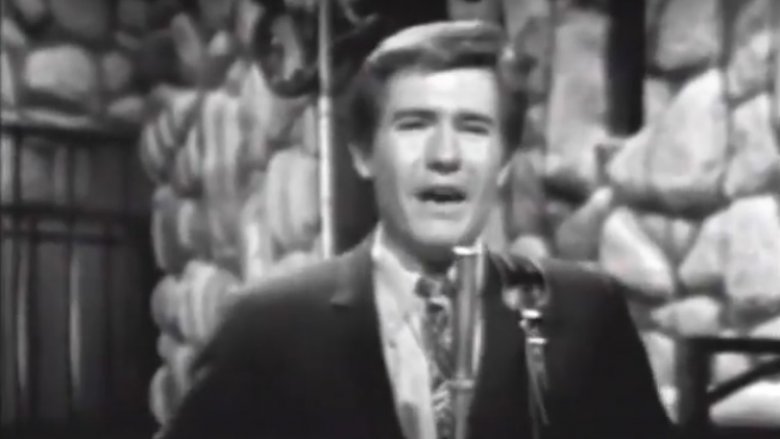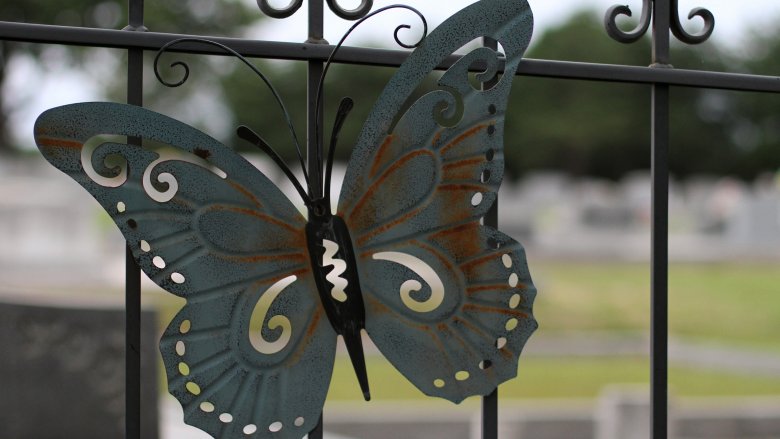Rock Stars Who Died Under Suspicious Circumstances
When a rock star dies unexpectedly, the question of how they died can loom as large as the memory of how they lived. If the post-mortem math doesn't add up, it divides public opinion on how to interpret the circumstances. Multiple theories emerge, and it can be difficult to differentiate suspicious positions from legitimate suspicions.
Some allegations belong to a constellation of baseless rock star conspiracy theories. When Elvis checked into the Heartbreak Hotel in the sky, for example, a handful of shook-up fans denied that he even died. Ignoring irrefutable proof of his passing, Elvis truthers cited Elvis sightings and a tombstone typo as evidence that the King staged his demise. While a parade of crying clowns couldn't rival the laughable sadness of that idea, not every case suffers from such obvious fact-blindness. In the instances below, relevant details surrounding rock star deaths created reasonable doubts about whether the official narratives reflected reality.
A Mississippi queen kills her Mountain king
Rock and roll royalty bowed to Felix Pappalardi. A music school dropout who often outclassed major musicians, he could play virtually any instrument. Also a virtuoso at arranging music, Pappalardi produced multiple albums for Eric Clapton's group Cream and hammered out much of their hit single "Strange Brew." Afterward he became the bassist for Mountain and the basis for its sound. As the New York Daily News detailed, Mountain front man Leslie West credited Pappalardi with teaching him many music dos and don'ts.
After Mountain's popularity peaked with "Mississippi Queen," Pappalardi departed the band to save his hearing, but he kept busy with narcotics and extramarital affairs. Pappalardi had a very open marriage with lyricist Gail Collins, who wrote the strangest lines of "Strange Brew." She tolerated his tomcatting until 1982, when Pappalardi fell in love with would-be singer Valerie Merians. Collins mourned their moribund marriage. In April 1983, Pappalardi returned home after making bedroom music with Merians and wound up with a bullet in his neck.
Collins had shot him with a handgun he gave her as a gift. She then called her attorney, who advised her to call 911, which she hadn't done. When talking with police, Collins called the incident "an accident during a 6 a.m. firearms training session." Detectives discovered the ripped-up remnants of the couple's marriage certificate in the trash and understandably weren't convinced. A jury, however, was. Collins spent two years in prison for negligent homicide.
(I can't get no) satisfactory explanation
Brian Jones named the Rolling Stones after Muddy Waters' "Rolling Stone Blues." He also assembled the band, imbuing its tunes with rhythm and blues. Those blues were painted black in 1969 when Jones got fired from the band and died a few weeks afterward. Partly relying on eyewitness testimony, a coroner concluded that Jones drowned in his swimming pool during a drug-fueled "misadventure." However, subsequent statements muddied the waters.
Per the BBC, the musician spent his final night alive with girlfriend Anna Wohlin, friend Janet Lawson (who found Jones' body), and builder Frank Thorogood. Lawson recalled that Jones and Thorogood went on an ill-advised "midnight swim" after consuming pills and alcohol. But when she spoke with a private investigator decades later, her version of events evolved.
As Rolling Stone recounted, according to Lawson's updated account, Jones and Frank Thorogood had horsed around in the pool around the time Jones died. She "saw Thorogood shaking badly" before seeing Jones' body. In 2005 Anna Wohlin made similar assertions, telling the Independent she thought Thorogood inadvertently killed Jones during "some sort of horseplay." She added that Thorogood made no effort to aid Jones.
A 1994 book also accused Thorogood, claiming he confessed on his deathbed to Rolling Stones driver Tom Keylock. In 2009 a former Stones road manager accused Keylock of killing Jones and silencing witnesses with threats. What about the supposed substance abuse? Drugs hardly turned up during the autopsy.
Papa was a rolling stone; was Mama a stone-cold killer?
When you look at the group's musical malleability and multi-generational success, it's tempting to call the Temptations the "Adaptations." As trends changed, they changed, according to the Rock and Roll Hall and Fame. Lead singer Dennis Edwards took the helm in 1968 and steered the Temptations into their funk-rock phase. According to his obituary, he proved instrumental in producing several memorable songs, including the hugely popular "Papa Was a Rollin' Stone" and "Cloud Nine," the latter of which earned the group its first Grammy Award.
Edwards died a legend in 2018 at age 74. His wife Brenda said he succumbed to meningitis. However, court records suggested something sinister. Shortly before Edwards passed away, the Health Care Consortium of Illinois filed an emergency protection order on his behalf. As the Detroit News detailed, the consortium accused Brenda of attempting to smother her Hall-of-Fame husband by pressing his face against a bed and denying him his hearing aids.
Adding to the suspiciousness, relatives related that Brenda increasingly isolated Edwards from the rest of his family. She even moved him from St. Louis, where he had lived for more than 30 years, to Chicago. Brenda denied harming her husband, and a coroner corroborated her meningitis claim. Nonetheless, it's worth noting that the timing of Edwards' demise suited her legally. Brenda was set to defend herself against the abuse allegations in court the week Edwards died. With no one left to protect, the case against her was dismissed.
Mayhem goes from black metal to bloody murder
Formed in 1984, Norwegian band Mayhem birthed black metal, which The Guardian described as "the most extreme form of music imaginable." Mayhem weren't just dark; they made black holes seem like sunlight by comparison. The members sported stage names like Necro Butcher, unironically hailed Satan, and chucked animal heads at audience members. That's the tame stuff. Bassist Count Grishnackh (who later assumed the name Burzum and espoused Nazism) and guitarist Snorre Ruch would serve prison time for church burnings and murdering fellow Mayhem member Euronymous.
Grishnackh (real name Varg Vikernes) insisted it was self-defense. He and Euronymous (Øystein Aarseth) had a falling-out over finances and politics. Then Euronymous supposedly threatened to murder Grishnackh. According to Black Metal: Evolution of the Cult, Euronymous habitually threatened people and even bragged that he attempted to poison someone. Overall, he wanted to out-evil people, and sometimes he succeeded. Euronymous once assaulted someone with a broken bottle. He also prided himself on photographing a dead bandmate and apparently mailing pieces of the deceased's skull to other black metal musicians.
Most people dismissed Euronymous' threats as grim games, but Grishnackh (pictured above with his lawyer) wasn't playing. In 1993 he arrived at Euronymous' door with a knife. Bandmate Snorre Rush, who drove Grishnackh to the crime scene, said the slaying was premeditated. Grishnackh later maintained that he just wanted to beat the excrement out of his foe but was attacked. Either way, he ended up chasing and attacking Euronymous, who was found with 23 wounds — some from Vikernes' knife and some from allegedly falling on glass during the struggle.
Mr. Misery becomes Mr. Mystery
Remember the soothingly gloomy song at the end of Good Will Hunting? That was the Oscar-nominated "Miss Misery," which earned singer-songwriter Elliott Smith the moniker Mr. Misery. Known for his melancholic compositions, the gentle-voiced singer wrote about what he knew: addiction and dejection.
Sadly, Smith's dourness devoured him. As The Guardian detailed, despite performing during the 1998 Academy Awards ceremony and seeing substantial record sales afterward, "the unhappiest man in the land" sought solace in alcohol and hard drugs. He fretted when friends tried to help him. He frequently threatened to take his own life during disagreements, and in 2003 he might have.
Smith allegedly had a heated argument with girlfriend Jennifer Chiba. According to Chiba, she locked herself in the bathroom, heard a scream, and reemerged to find Smith with a knife through his heart. He supposedly wrote a suicide note. It seemed like a straightforward case, but the autopsy uncovered signs of a struggle. Smith had two stab wounds in his chest plus cuts that indicated he was defending himself. Moreover, he lacked the "hesitation wounds" typically left by suicide attempts.
When the findings appeared online, Chiba appeared on MTV News to express indignation and proclaim her innocence. She later sued Smith's estate for over $1 million per the Hollywood Reporter, claiming she deserved some of his earnings. She lost.
If you or anyone you know is having suicidal thoughts, please call the National Suicide Prevention Lifeline at 1-800-273-TALK (8255).
People are strange; his end was stranger
Jim Morrison was so awesome that paleontologists named a prehistoric lizard after him. The Doors lead singer had looks, locks, and lyrics. Equal parts poet and rocker, Morrison sang with entrancing intensity and howled like a musical Ginsberg. He lit everything up with "Light My Fire" and showed off-the-cuff creativity when performing "The End." But when 27-year-old Morrison met his end in 1971, the world was kept in the dark.
Morrison died in Paris on July 3, but Rolling Stone noted that Doors manager Bill Siddon didn't inform American news outlets until July 9, two days after the legend was laid to rest. (Siddon later related that Morrison's loved ones wanted privacy.) Journalists had heard days earlier that Morrison died, but when they tried to confirm what occurred, they were told the singer simply needed rest. Before discovering otherwise, French reporters even wrote that he had "minor malady."
According to Morrison's death certificate, he had a heart attack. But nobody conducted an autopsy. Morrison's wife, Pam, claimed he coughed up blood before apparently passing away while bathing. This supports reports that Morrison died of a respiratory ailment. However, the singer supposedly seemed healthy beforehand, and Pam apparently didn't witness his death. Band photographer Bobby Klein told The Guardian that the Doors' producer told him Morrison mistook heroin for coke and fatally inhaled it. Musician Marianne Faithfull blamed an ex-boyfriend, telling the Telegraph her former beau sold Morrison powerful heroin, inducing an accidental overdose.
Was Sid really that vicious?
There's a reason they went by the "Sex Pistols" and not the "Love Guns." The U.K. punk rockers were the musical equivalent of an open-handed face slap. While the Pistols blew their shot at a long career, they'll long be remembered for bad-boy bassist Sid Vicious and his groupie girlfriend Nancy Spungen.
Although not a musician, Nancy was a rock star in her own right, according to NY Magazine. She was a prominent presence in the nascent punk scene and an acted as an able ambassador of punk rock. Sid, meanwhile, oozed unrepentant irreverence and famously simulated shooting his audience after a rock rendition of Frank Sinatra's "My Way" in a mockumentary. Things decidedly did not go Sid's way in October 1978 when Nancy was fatally stabbed in the New York hotel room they shared. Maybe?
Sid originally copped to killing Nancy, telling the cops, "I did it because I'm a dirty dog." But he soon barked a different tune, noted the Independent, claiming he was unconscious during the murder. A court never decided if the sleeping dog lied because Sid OD'd on heroin. However, some people pointed the finger at drug dealers who frequented Sid and Nancy's room. Furthermore, someone seemingly stole $1,500 from the pair, so maybe it was money-motivated murder. The plot further thickened when Sex Pistols photographer Peter Gravelle alleged that Sid's mom delivered the lethal heroin dose to her son to save him from prison.
Authorities miss a clue about a missing musician
In 1992, Manic Street Preachers guitarist and lyricist Richey Edwards drunkenly moonwalked on top of a bar. Why? Because he was happy. That anecdote demonstrated a facet of the rock star that his fellow Preachers felt people overlooked, according to NME. Sadly, the other facets didn't moonwalk. Edwards suffered from depression and regularly resorted to self-harm.
Edwards' sadness saturated his work, most notably the album The Holy Bible. As The Guardian elaborated, his lyrics often referenced his personal demons. At the time his bandmates interpreted his lyrics as a "journalistic" exploration of "the cruelty of humanity filtered through Richey's amazing intellect." In retrospect it sounded like a cry for help. In February 1995, Edwards went missing from a London hotel. After three weeks of searching, authorities located his car at a bridge where people often end their lives, per the Independent.
In 2008 Edwards was presumed dead. However, many people reject the notion, noting that Edwards publicly stated he would never take his own life. Moreover, in the days preceding his disappearance, he consistently withdrew substantial sums of money from an ATM. There have been several unconfirmed sightings over the years. In 2018 Edwards' relatives learned the guitarist's car arrived at the bridge 12 hours earlier than originally thought, so for 20 years, requests for information have focused on the incorrect window of time.
If you or anyone you know is having suicidal thoughts, please call the National Suicide Prevention Lifeline at 1-800-273-TALK (8255).
He fought the law, but maybe the lawless won
It takes a special kind of talent to turn a song about an outlaw losing his freedom into an outlaw anthem. Luckily, Bobby Fuller brimmed with ability. Fittingly, his musical muse was Buddy Holly, whose buddy Sonny Curtis wrote "I Fought the Law," per The Guardian. First performed by Holly's band the Crickets in 1960 (the year after Holly perished in a plane crash), the song gained nationwide acclaim when Fuller covered it in 1966.
Ready to play Six Degrees of Buddy Holly? Fuller and his band (the Bobby Fuller Four) signed with record producer Bob Keane, who discovered Ritchie Valens; Valens died alongside Buddy Holly. Six months later Fuller died. He was 23. The details are as traumatic as they are tragic. The singer's mother discovered him dead in her car. He had a tube extending from his hand to a can of gasoline. Investigators instantly ruled it a suicide, declining to even collect fingerprints or evaluate other possibilities. Their judgment proved premature.
The Houston Press reported that Fuller was soaked with gasoline, bruised and bloodied, and had been decomposing for substantially longer than the car was parked. All these clues indicated an involuntary death, which some have attributed to mobsters. Unable or unwilling to pursue criminal leads, law enforcement reclassified the tragedy as an accident. However, the evidence doesn't gel well with that theory, either. As Fuller's brother wondered, "Who would pour gas on himself in a hot car?" Excellent question.
In-A-Gadda-Da-Evil?
In 1966 Iron Butterfly took flight with "In -A-Gadda-Da-Vida." The hauntingly trippy song made ideal ear fodder for flower children and Freddy Krueger. Philip Taylor Kramer took over as Iron Butterfly's bassist and lead singer from 1971 until the band disbanded in 1975. The Washington Post reported that he recorded two albums that floundered. He attained greater success in the tech world, though.
Described by Variety as "a science whiz kid" who built a laser capable of downing balloons at age 12, Kramer became a computer company executive. Soon after his company acquired pioneering video compression technology for CD-ROMs, he vanished. In 1995 the ex-rocker turned executive traveled to the LAX airport to pick up a business associate. Instead, he dialed 911 to announce he was killing himself and that "O.J. Simpson is innocent." Then, radio silence. It seemed inexplicable. Kramer seemed mentally sound, had kids he loved, and didn't do drugs.
Kramer's disappearance appeared on Unsolved Mysteries. His mother thought he'd been abducted, and because of his tech ties a congressman suggested his case had national security implications. The Washington Post pointed out that Kramer's business had gone belly-up around the time he vanished and argued that his confusing 911 call showed he had cracked under pressure. Per the LA Times, in 1999 hikers encountered Kramer's bones inside his van in a canyon.
If you or anyone you know is having suicidal thoughts, please call the National Suicide Prevention Lifeline at 1-800-273-TALK (8255).

